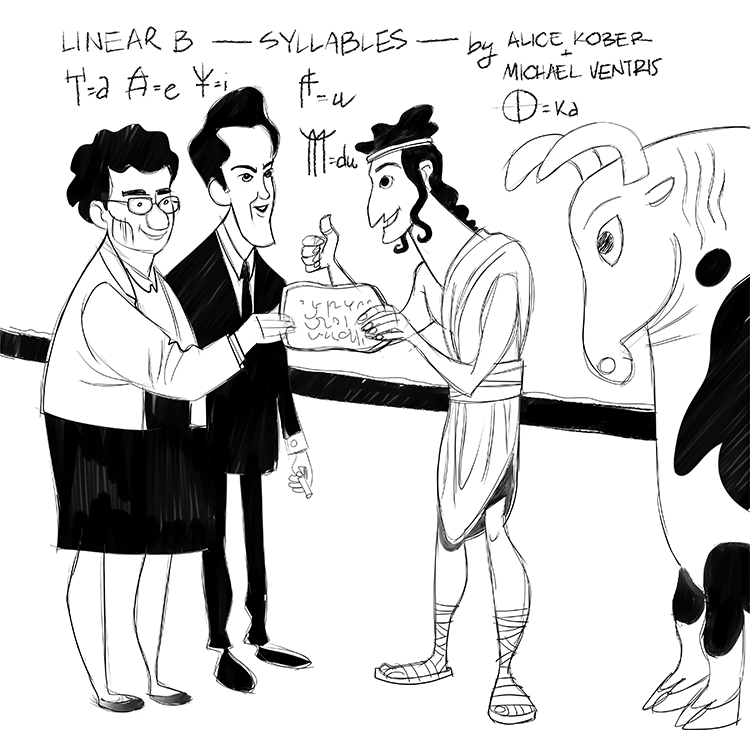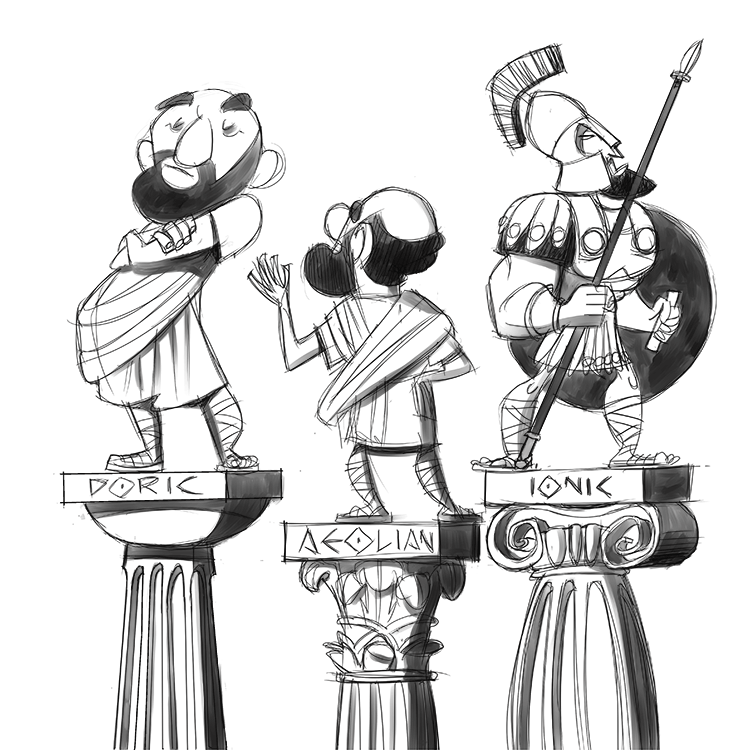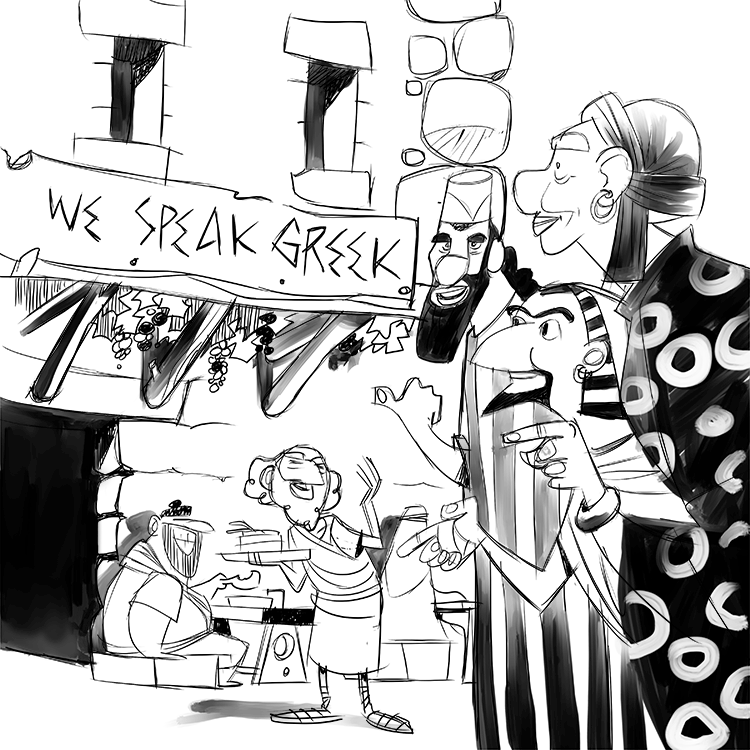“It’s all Greek to me!”
In today’s language, we use this phrase to make it known that we don’t understand something. But if you live in Europe or western Asia, or somewhere that speaks a language that comes from there, then this phrase has a different meaning. It actually describes the roots of your language.
This is because Greek, the language of the famous cities of Athens, Sparta, Thebes, and more, is one of the oldest languages in the world. And its influence can be found in many different modern languages.
But beyond influencing other languages, ancient Greek also played an important role in the development of civilization. It helped bring cultures together, and made some of the world’s first works of literature possible.
Today, people still speak Greek, though the modern language is nothing like its ancient ancestor. But that the language has survived to this day speaks of its significance, and reminds us just how much of our history has been shaped by words.

Proto and Mycenaean Greek
The first versions of ancient Greek are actually the ones we know the least about. In fact, the very first form, Proto Greek, may not have really been Greek at all.
The only reason we even really call it Greek is because it was the language spoken by people living on the land that would later become Greece.
It was spoken in the region until about 2500 BC. After that, the Hellenic people (who would later become the Greeks) began moving into Greece. These languages mixed and evolved into what would later become Greek.
One of the most significant languages to come from Proto-Greek was Mycennaean Greek. The Mycenaens built the first civilization of ancient Greece. It reached the peak of its power and prosperity between c. 1600 and c. 1100 BC.
During this time, the Mycenaean Greeks spread throughout Greece, and as they did, their language became more widespread. This version of Greek, known as Linear B Greek, was the first form of unified Greek, meaning it (or some dialect of it) was spoken by everyone in the Greek world.
Sadly, the Mycenaeans didn’t write anything down. Or, if they did write, we’ve never found any of their work. This limits our knowledge of this culture and helps keep them a mystery.
However, the Mycenaeans play an important role in the larger Greek story. During the Classical Era (the times of Athens and Sparta), a lot of literature told stories of the Mycenaeans, the most famous being the Iliad and the Odyssey.
In this way, the Mycenaeans helped build the foundation for a common Greek culture, and this helped Greece prosper during the Classical Era, allowing it to have the profound impact on today’s world that has helped the ancient Greeks achieve eternal fame.

Ancient Greek
Somewhere around 1100 BC, the Mycenaean civilization collapsed. A combination of factors, ranging from a shift in weather to an invasion from abroad, wiped them off the face of the Earth. But this did not kill the Greeks.
Instead, a new group of Greeks emerged, and they spoke an entirely different version of Greek, though its roots were Mycenaean.
This version of Greek is simply called Ancient Greek, which is confusing since all of these versions of Greek are ancient. But to make things a bit clearer, it was the version spoken during the Classical Era (c. 600 – c. 300 BC).
One thing that was special about Ancient Greek was that it had a written component as well. The Greeks borrowed and adapted the Phonecian alphabet, which was the first to use symbols to represent sounds and not just ideas and concepts, to make their own set of letters. From there, they began writing things down, which is why we now know so much about the Ancient Greek world.

The Dialects of Ancient Greek
Within ancient Greek, there were three main dialects ─ Ionian (also known as Attic), Doric, and Aeolian.
Attic Greek was the main dialect of Athens, and it was spoken in lands that had been settled by the Athenians. One of these territories was Ionia ─ the southwestern coast of modern-Turkey ─ which is why it has both names, Attic and Ionian.
Doric Greek was spoken mainly by the Spartans and the other cities of the Peloponnese, the southernmost peninsula of mainland Greece. And Aeolian Greek was the primary language of Boeotia, the region of Thebes, as well as northern Greece.
While speakers of these three different dialects would have been able to understand one another completely fine, this did not make them friends. In fact, it drove them apart. Part of the reason why Athens and Sparta were such rivals is because they saw themselves as different people.
Plus, Athens’ affiliation with other Attic Greek speakers caused them to support the Ionian Rebellion of 499 BC. This decision really ticked off the Persians (who controlled Ionia at the time) and led to the Greco-Persian War, a nearly-50-year conflict that dramatically reshaped the political landscape of the ancient world.

Koine Greek
After the fall of the Classical cities, (Athens, Sparta, Corinth, Thebes, etc.), Ionian and Doric Greek slowly began to mix together, leading to the formation of the first common Greek dialect.
Not only did this simplify the Greek language, but it also helped spread Greek influence throughout the rest of the world. Koine Greek emerged around the time that Alexander the Great was conquering the world, and it became the common tongue throughout many of the lands he took.
After Alexander the Great’s death, Greek continued to be used to conduct business, teach, spread religion, and more, mainly because it was understood by so many people across so many different lands.
Later, when Rome emerged as a superpower and conquered much of Europe, western Asia, and north Africa, they adopted Greek as an official language simply because of how widespread it was. In fact, in the early days of the Roman Empire, the city of Rome became bilingual, with Greek being just as common as the native Latin.
The influence of Koine Greek would remain through much of Roman times, and it had a profound impact on the modern Western world. For example, Christianity in its early days was taught primarily in Greek, and the first versions of the New Testament were written in Greek. Surprising since the Catholic church continues to use Latin as its primary language even to this day. But back in the old days, it was all in Greek!

Greek Lives on Until Today
After the Roman empire fell, a new version of Greek emerged ─ Byzantine Greek. An evolved form of Koine Greek, this dialect became the official language of the Byzantine Empire, which lasted until the 14th century.
Because it’s been around for so long, and because it’s been the official language of so many lands throughout history, Greek’s influence can still be felt today.
Many words ─ democracy, philosophy, psychology, octopus, among many others ─ come directly from Greek. And we get the roots of many words from them, too. For example, the root auto, which means self, and biblio, which means book, both come from Greek.
So, while there are currently only around 12 million Greek speakers in today’s world, its influence on the many languages we currently speak means that, in a way, we all speak a little Greek.
Written by Matthew Jones
Illustrated by Pablo Velarde Diaz-Pache
